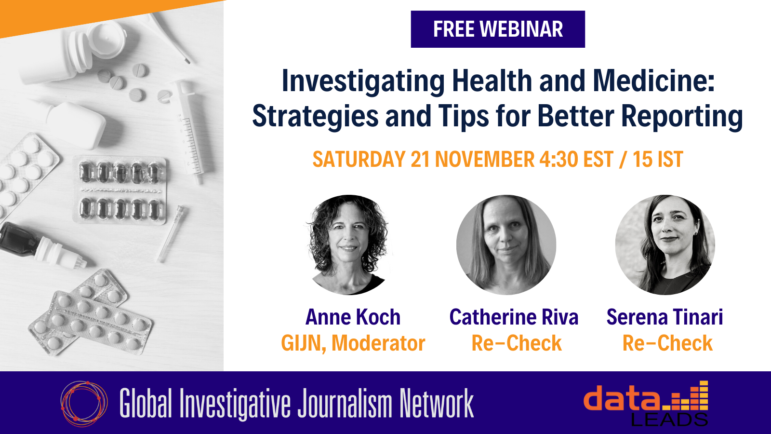

GIJN Webinar — Investigating Health and Medicine: Strategies and Tips for Better Reporting
Editor’s note: This webinar has now taken place. You can see the recording on GIJN’s YouTube channel.
The COVID-19 pandemic has forced many journalists to become healthcare experts overnight – no easy task. This session will focus on how journalists and others can use proven techniques not only to produce stronger and better journalism about drugs and medicine, but to find new angles for inquiry and investigation.
This GIJN webinar, “Investigating Health and Medicine,” open to everyone and free, is produced as part of the Misinformation in Medicine Summit, a two-day event convened by DataLEADS and hosted by the Google News Initiative as a part of the APAC Trusted Media Summit 2020.
At the session, GIJN will also launch a major new reporting guide, “Investigating Health and Medicine.” Aimed at journalists and others seeking to use evidence-based reporting on health topics, the 90-page guide covers such issues as the COVID-19 pandemic, drug development, medical studies, assessing evidence, corporate influence and conflicts of interest.
Join GIJN and the report’s two authors:
Serena Tinari and Catherine Riva are medical investigative journalists and co-founders of Re-Check, a Swiss nonprofit organization dedicated to investigating and mapping health affairs. Re-Check produces multi-language publications, supports newsrooms on their health investigations and gives workshops to learn how to perform in-depth research on medicine and public health.
- Ms. Tinari has worked across print and electronic media, radio and television since 1994. She authored dozens of investigative stories for the Swiss public broadcaster. Tinari specializes in drug safety, Evidence-Based Medicine and conflicts of interest. A trainer, speaker and moderator, she has been reporting extensively on Swine Flu and Tamiflu.
- Ms. Riva specializes in design and methodology of clinical trials, public health and Evidence-Based Medicine. A trainer and a speaker, Riva has reported on the Mediator case, breast cancer screening programs, the controversies related to HPV vaccination and on conflicts of interest in healthcare and medical research. She has also published in several biomedical journals.
Moderator Anne Koch is the program director at GIJN and previously was a journalist and editor at the BBC for 20 years.
GIJN is the largest global network of investigative journalists, with 203 member organizations in 80 countries. Since the pandemic began, its staff has produced more than 30 webinars in six languages on reporting COVID-19. You can find those and more at the GIJN Resource Center. To keep up to date with GIJN’s work, follow us on social media and through our newsletters.









